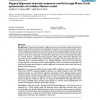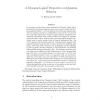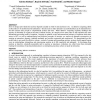1206 search results - page 186 / 242 » Modelling Information Systems as Object Societies |
126
click to vote
BMCBI
2004
14 years 11 months ago
2004
Background: Certain protein families are highly conserved across distantly related organisms and belong to large and functionally diverse superfamilies. The patterns of conservati...
SLOGICA
2008
14 years 11 months ago
2008
In this paper we show how recent concepts from Dynamic Logic, and in particular from Dynamic Epistemic logic, can be used to model and interpret quantum behavior. Our main thesis ...
MMM
2005
Springer
15 years 5 months ago
2005
Springer
The efficient management of complex objects has become an enabling technology for modern multimedia information systems as well as for many novel database applications. Unfortunat...
115
click to vote
IJMMS
2007
14 years 11 months ago
2007
How we design and evaluate for emotions depends crucially on what we take emotions to be. In affective computing, affect is often taken to be another kind of information - discret...
TRUSTBUS
2007
Springer
15 years 6 months ago
2007
Springer
Abstract. A Virtual Organisation (VO) is a temporary alliance of autonomous, diverse, and geographically dispersed organisations, where the participants pool resources, information...



